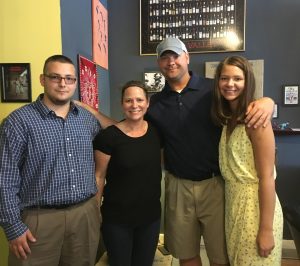For sisters Blair and Brienne Babione, who inspired the Carmel City Council to enforce gender-neutral road signage, summer vacation began with a visit to US Aggregates’ Delphi quarry.
- Blair and Brienne Babione, sisters from Carmel known for their role in a recent City Council resolution enforcing gender-neutral road signage, were invited by Heritage Construction + Materials to visit US Aggregates’ Delphi quarry.
- The tour focused on careers in the materials sciences, a booming field where women are historically underrepresented.
- The girls’ father, John Babione, began his own career at Heritage Environmental Services after he graduated from college.
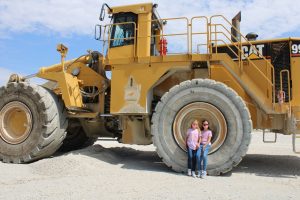
Brienne and Blair pose in front of one of US Aggregates’ wheel loaders.
Over the course of winter 2020, Blair and Brienne Babione noticed “Men Working” signs in their Carmel, Indiana, neighborhood. The girls, who had seen women on road work crews before, questioned the wording on the sign.
“We thought it was unfair to girls because it said, ‘Men Working’, and some girls want to do construction,” said Brienne, 9.
The sisters had reason to challenge the gender-specific language they saw. According to the National Association of Women in Construction, women make up almost 10% of the construction industry. The signs, placed around the City of Carmel by a contractor, were in violation of the 1988 Manual of Uniform Traffic Control Devices, which has prohibited “Men Working” signage in favor of more specific pictograms like a flag or human figure. After questioning the signage, Brienne and her sister Blair, 11, researched the history of the sign with the help of their mother, Leslie Babione. They found out that the MUTCD phased out the use of Men Working signs decades ago. The girls then decided to write letters to the Carmel City Council advocating for the signs to be removed. Those letters spurred City Council President Sue Finkam to introduce a resolution enforcing the MUTCD regulations.
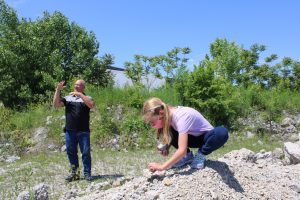
Brienne Babione selects fossils as Bill Corbett explains how they are formed.
“’Men Working’ or ‘Men At Work’ signage communicates the false and unacceptable message that women cannot or should not work in the construction trades or other related fields,” the resolution reads.
Thanks to the actions of Blair and Brienne, the resolution was passed. Soon, the story went viral as a source of inspiration during the COVID-19 pandemic, garnering national news coverage from Good Morning America, USA Today and more.
“I wanted to thank them for using their voices,” said Kierstin Janik, Chief Talent Officer of Heritage Construction + Materials.
Janik, a woman working in the construction industry and a fellow Carmel resident, heard about the girls’ story and decided to reach out.
“As a woman in a male-dominated industry, it’s important to me that I encourage young girls to be interested in what we do. They need to see that there are role models paving the way,” said Janik.
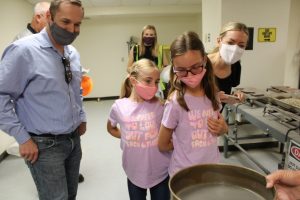
John, Brienne, Blair and Leslie examine a vessel used to heat aggregate samples.
On behalf of HC+M, Janik sent a gift basket to the Babione home with construction-themed toys and treats. She made sure to include a note inviting the girls to visit US Aggregates’ Delphi, Indiana, stone quarry over their summer break.
The sisters were on board. Both took an interest in the labeled rocks included in the gift basket, and Blair mentioned her interest in a career in geology. Brienne, a collector of rocks and shells, who had to miss her third-grade field trip to a rock quarry because of the pandemic, was thrilled to make the visit. With clear skies in the forecast, June 4 was the perfect day to visit.
The girls and their parents were met by Bill Corbett, Plant Manager at the Delphi quarry. Corbett modified his typical tour to introduce the girls to aspects of a career in the material sciences. The tour began at the on-site lab, where the Babione family learned how various products were monitored for quality. The girls got to meet Serena Cade, Quality Control Technician for US Aggregates, who was working on drying and testing samples during the tour.
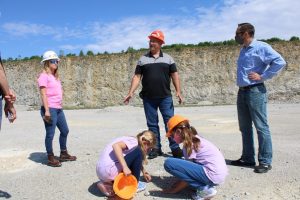
Kierstin Janik and John Babione listen to Plant Manager Bill Corbett in the quarry while Brienne and Blair hunt for rocks.
“Gender has nothing to do with how successful someone may become,” Cade later said. “If you want it, go and get it. Nothing is stopping you.”
Corbett took the family through the quarry, answering questions like “Why are the rocks shiny?” and “How does the front loader run?” Surrounded by machinery, piles of fossils and a shockingly clear blue lake, the Babione sisters learned all about careers in the construction industry.
Exposing more young girls to construction and the materials sciences can help drive female participation in those industries. As of 2018, 971,000 women were employed in the construction sector. Contrasted with the number of men in the industry (which is 10 times higher), it’s clear that there’s still a “concrete ceiling” to be shattered. So how can the construction industry address it?
According to Corbett, it’s investing in young talent like Blair and Brienne.
“When kids come to the quarry, we really focus on encouraging them. Kids have a natural curiosity about this stuff that can turn into careers for them when they grow up.”
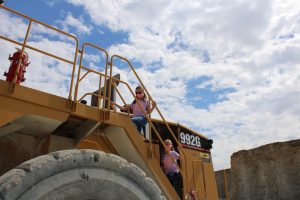
Blair and Brienne scale a wheel loader.
US Aggregates has partnered with various local organizations to promote awareness of construction careers and passion for material sciences. Groups of students from local schools regularly visit US Aggregates quarries for tours focusing on technical career skills and operations (students from Area 30 recently visited the Cloverdale location). Building a safer, more enriching and sustainable world means having women in the industries that make our world work — and the Babione sisters agree.
“If people don’t speak up, then it won’t change,” Blair said.
Organizations like NAWIC and Women of Asphalt aim to empower women in the construction industry and recruit the next generation of female construction professionals. Members of the Heritage family seek to do the same through educational initiatives like Kids Science Camp, which took place virtually in July 2021.
–
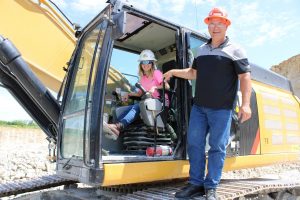
Janik and Corbett show off one of US Aggregates’ material handlers.
“Our community outreach and youth engagement are really important for showing young girls (and any young person) that our construction and materials industry not only exists, but it’s interesting and could be a viable career for them,” said Janik. “We, as a company and industry, have to embrace the change in talent pool demographics and be diligent about the signals we are sending about inclusion.”
Blair and Brienne’s father, John Babione, is one of the many professionals who began their career as members of the Heritage family; when he graduated from college, Babione started working at Heritage Environmental Services in Indianapolis. His daughters’ interest in the materials sciences reminded him of the beginnings of his own career.
“I was inspired by all the very bright people working at HES and the innovative solutions they were working on to help customers responsibly manage industrial waste,” he said. “Working there made me want to obtain an advanced degree, which led me to attend law school.”

John, Leslie, Blair and Brienne Babione pose in front of the lake at the Delphi quarry.
–
Babione looks back fondly on his time with the Heritage Family from his career in law.
“I was amazed at becoming reconnected to the Heritage Group all these years later through my children,” Babione added. “It shows me that the great company I worked for years ago continues to be a leader in the community.”
What’s next for the Babione sisters? A career in geology could be in store for Blair, whose favorite part of the quarry tour was exploring the machinery used to load and transport aggregates. Her younger sister Brienne aspires to be a veterinarian. But first, the girls look forward to a summer vacation full of dance lessons, 4-H projects and library books on one of their favorite subjects: women’s history and the suffrage movement.

